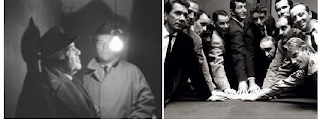In Breathless, we saw Humphrey Bogart in Jean Paul Belmondo’s Michel Poiccard. Then last week in Alphaville, we saw Eddie Constantine’s Lemmy Caution revisit some of Bogart’s characteristics, particularly regarding smoking.
This got me thinking about the American influence on characters in Godard’s films, a topic that I have been wondering about since our Cesare Zavattini readings. (I will come back to Zavattini soon.) While watching Alphaville, I recognized the first man Lemmy Caution must find. His real name is Akim Tamiroff and he was a character actor in a number of American films including two Preston Sturges films, Orson Welles’ Touch of Evil and Ocean’s Eleven with Frank Sinatra and Dean Martin. (In the second photo, Tamiroff is the 5th head from the left, next to Peter Lawford.)
As we know, Sinatra had been Godard’s original choice for Paul Javal in Contempt. Michel Piccoli, the man who ended up playing Paul Javal, references Dean Martin in Some Came Running, a film starring Sinatra. (Paul is referring to wearing his hat in the bathtub and Martin’s character never took his hat off, even in the bathroom. To see the clip of Dean Martin in Some Came Running, in the bathroom with his hat on go to http://www.youtube.com/watch?v=XDaVg_JZrbg&feature=related at about the 6:30 mark—it’s in German here though!)
In the photo above, Brigitte Bardot’s Camille is wearing a black wig similar to the hairstyle of Anna Karina in Vivre sa Vie. Karina’s Nana is quite similar in her overall look to Louise Brooks, the silent movie actress. (And while it is true that Brooks worked with GW Pabst in German films, she remained a contract player at Paramount where she originated her look.)
Keeping these American influences in mind, I return to Zavattini who said in his A Thesis on Neo-Realism “whereas we are attracted by the truth, by the reality which touches us and which we want to know and understand directly and thoroughly, the Americans continue to satisfy themselves with a sweetened version of truth produced through transposition.” (Zavattini, 69) This condemnation brings up a series of questions:
Would it be accurate to describe Godard’s relationship to the American cinema as a secondary relationship, a step removed from any primary responsibility since he is not American and does not make films in America?
If we can say that his is a secondary relationship, is it that removal which allows his characters to be inspired yet their American influences to be lacking, if we agree with Zavattini?
Is American film redeemable to someone like Zavattini through Godard’s films?
Is there a way in which the American aversion to truth is helpful with regards to Godard’s filmmaking?
If American filmmaking is “undergoing a crisis” (Zavattini 69) yet adding to the films of Godard, how can we reconcile the state of American films? Does this reflect in any way poorly on Godard to someone like Zavattini?
If American films are integral to non-American films, how can we understand Zavattini’s observations which suggest a concrete separation of international cinema?
Sienna






